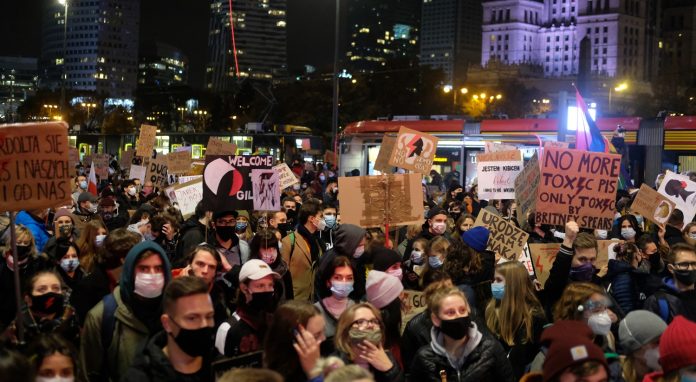Rose Kwiecinska, Newham and East London Socialist Party
The anti-abortion regulations existing in Poland since 1993, commonly referred to as the ‘abortion compromise’, have been modified twice following Constitutional Tribunal rulings.
The first change took place in 1996 when the ‘Constitutional Tribunal’ ruled the provision allowing abortion when “a pregnant woman is in difficult life conditions or a difficult personal situation” unconstitutional.
The second amendment took place after the Tribunal’s decision on 22 October 2020, declaring the rule allowing abortion in cases of severe and irreversible fetal damage and incurable disease threatening its life unconstitutional. Since then, legal abortion is only possible when “pregnancy poses a threat to the life or health of the pregnant woman” or when there is a “reasonable suspicion that the pregnancy resulted from a prohibited act”.
This decision sparked a wave of women’s protests and strikes throughout Poland, marking one of the largest anti-government movements in many years.
Three years later, the right-wing party PiS (Law and Justice), after eight years in power, has lost the elections, partially because of this movement.
On 15 October 2023, after winning the elections, the new government’s coalition agreement ordered that the Constitutional Tribunal’s 2020 decision be reversed.
Right now, there are four projects in the Sejm (Polish Parliament) regarding the liberalisation of abortion waiting to be voted on, including two projects of a social-democratic party Lewica (The Left) about the decriminalisation of abortion and the right of women to make their own decisions about their bodies until the twelfth week of pregnancy.
They were supposed to be voted on from 6-8 March but, on 5 March, the Marshal of the Sejm, Szymon Hołownia, suddenly changed his mind and moved the debate to 11 April.
Hołownia justified the decision claiming the votes should not take place during local election campaigning that will take place on 7 April.
The ‘All-Poland Women’s Strike’ (Polish feminist social movement) announced a demonstration on 8 March. And once again, women have been protesting.
The party of Hołownia, Trzecia Droga (the Third Way), wants a referendum concerning the matter of abortion. It was the participation of women in the elections that gave them the opportunity to be in the government. 68% of the Third Way electorate supports legalising abortion.
But a referendum is simply extending the road to legalisation of abortion and avoiding responsibility. In Polish law, nothing blocks the legalisation of abortion by means of a law.
Human rights shouldn’t be voted on – they simply belong to us. Under strong criticism, Hołownia backed down.
At the same time, when asked if he considers the possibility of liberalising abortion law, President Andrzej Duda (from Law and Justice) stated: “Abortion is the deprivation of human life, and if someone demands abortion, they are demanding the right to kill.”
In Poland 83% of people support the liberalisation of the current anti-abortion regulations. A significant 57% believe that abortion should be possible up to the twelfth week.
We have had to put up with a complete abortion ban for 30 years, because the ‘abortion compromise’ was essentially a ban. We should have to wait no longer for these basic rights.








